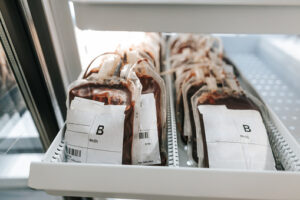Phthalates are plasticizers added to many everyday plastic products to increase its flexibility, transparency, and longevity. However, phthalates are also endocrine disrupters that have been linked to increased risk of cancer and reproductive toxicity. Accordingly, the European Union has banned the use of di(2-ethylhexyl) phthalate (DEHP) in blood storage bags beginning in May 2025. Despite the upcoming ban, non-DEHP blood bags result in increased hemolysis and shortened shelf life of RBCs. To better understand how prepared blood centers in Europe and other countries are to transition to other types of blood storage bags, a 24-question on-line survey was distributed to members of the Biomedical Excellence for Safer Transfusion (BEST) Collaborative. Sixteen responses from nine countries throughout the world were obtained—9 from Europe, 3 from Asia-Pacific and 4 from North America. Respondents were unclear on the best non-DEHP alternative blood bag or blood storage solution, and only one-third (3) of the centers in Europe have developed non-DEHP transition plans. The majority of respondents (12/16) were concerned about shelf-life and hemolysis. Respondents also expressed concern about bag validation and the associated secondary steps—irradiation, freezing, thawing, pathogen inactivation, and deglycerolization. The European Union’s push towards safer, more environmentally friendly blood bags represents a major challenge to most blood centers.
Reference:

